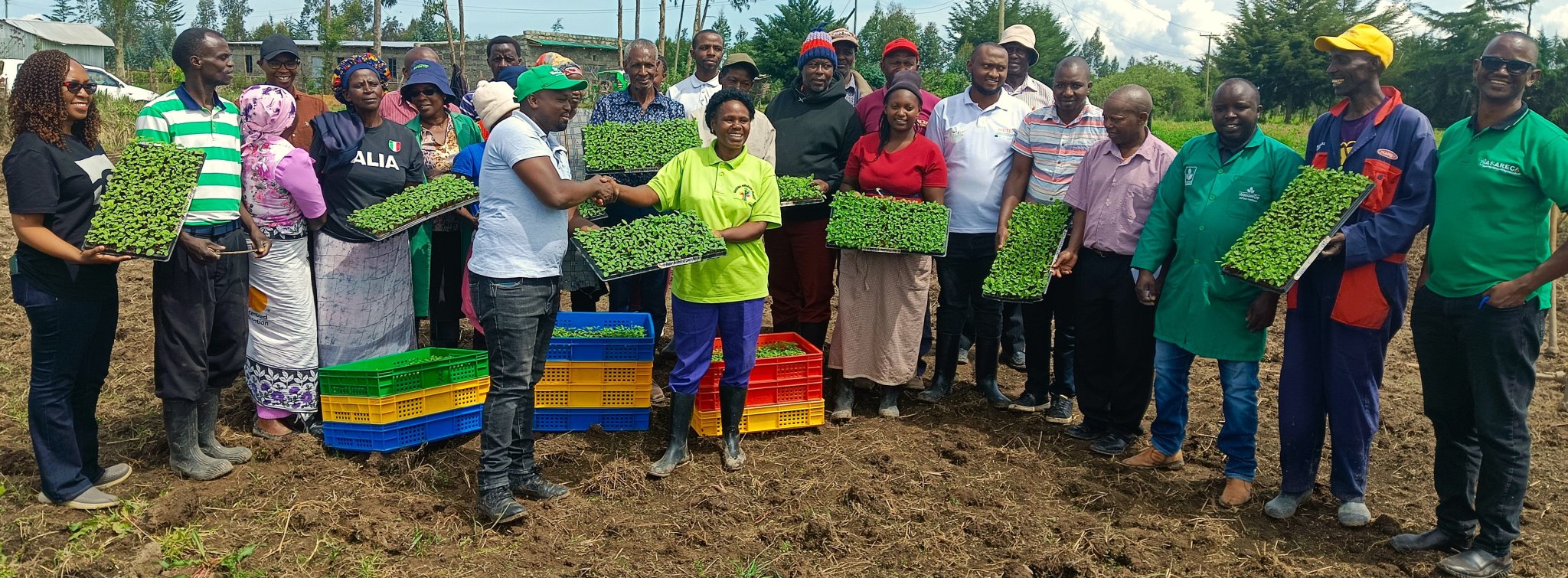
More than 100,000 potato farmers and stakeholders in Nakuru and Nyandarua counties are benefiting from a new initiative promoting Rooted Apical Cutting (RAC) technology, aimed at boosting potato yields and incomes.
The project, spearheaded by the Association for Strengthening Agricultural Research in Eastern and Central Africa (ASARECA) in partnership with Kenya Agricultural and Livestock Research Organization and Egerton University, is distributing high-quality, disease-free seed potatoes to improve productivity in Kenya’s leading potato-growing regions.
Targeting cooperative societies, agro-input dealers, agricultural officers, seed multipliers and village-based agents, the initiative focuses on farmers in Molo’s Marishioni ward and Nyandarua’s Murungaru area.
So far, 26,000 farmers have received preferred potato varieties including Shangi, Unica and Wanjiku. They have also benefited from 200 bags of fertiliser and assorted pesticides distributed in May 2025.
ASARECA’s programme officer for agricultural technology and innovation Dr Joshua Sikhu-Okonya said RACs offer a more reliable source of seed due to their resistance to disease and genetic consistency. “Genetically, these cuttings produce high-quality crops with high survival rates,” he said.
RAC technology involves taking plant tissue cuttings from disease-free potatoes grown in greenhouses, then rooting them in labs before transplanting them into the field. Each cutting can produce seven to 15 tubers, which are further multiplied and later distributed to farmers.
Compared to traditional seed tubers, RACs result in significantly higher yields and are better suited to climate-smart farming practices.
The initiative also supports the establishment of demonstration plots to showcase RAC’s benefits and build capacity among farmers. A field day scheduled for August 12 at Marishioni Trading Centre will further promote the technology and provide farmers with practical training.
Biometrician Scientist at Kalro Elias Kamau said limited access to quality seed is a major challenge for Kenyan farmers. “Quality seed can increase yields by up to 50 per cent. We are providing certified planting material to improve farmer incomes,” he said.
In addition to distributing RACs, the programme promotes climate-resilient practices, including drought and heat-tolerant potato varieties, biological pest control, post-harvest handling and crop insurance education.
Julian Barungi, ASARECA’s policy programme officer, said the initiative is aligned with national and global agricultural goals. “By working with researchers and development partners, we are helping farmers adopt innovative technologies that contribute to food security and economic growth,” she said.
The initiative is supported by the European Union, IFAD, Farm Input Promotions Africa (FiPS-Africa) and the National Potato Council of Kenya, under broader programmes such as the AIRTEA and CAADP XP4 Projects.
Kenya’s potato subsector supports 3.8 million people and is valued at over Sh50 billion. According to the National Potato Council of Kenya, around 160,000 hectares are under potato farming, with smallholder farmers accounting for 83 per cent of the production.
Annual output stands at 2.06 million tonnes, valued at Sh10 billion at the farm gate and Sh28.2 billion at the consumer level.
Leading potato-producing counties include Nyandarua (29.8 per cent), Nakuru (18.9 per cent), and Elgeyo Marakwet (16.2 per cent), with emerging potential in counties like Machakos, Embu, Kajiado and Samburu.
By providing improved seed and promoting climate-smart practices, the RAC initiative seeks to transform Kenya’s potato sector into a more profitable and sustainable venture for smallholder farmers.

















